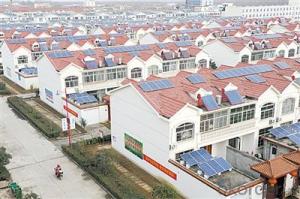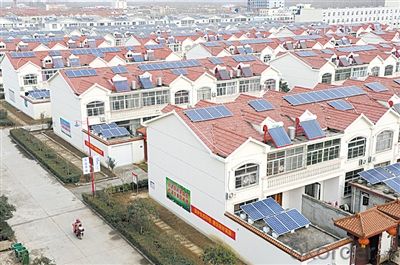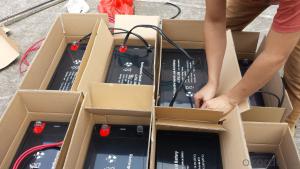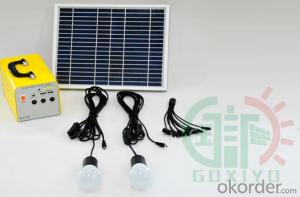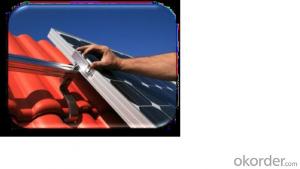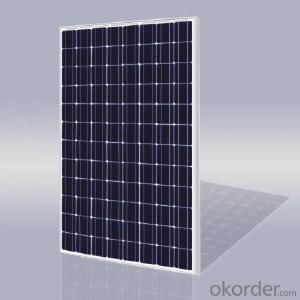Sharpe Solar Energy Systems - Roof Solar Power System Hot Sale Good Design
- Loading Port:
- Shanghai
- Payment Terms:
- TT or LC
- Min Order Qty:
- 500 watt
- Supply Capability:
- 2000000 watt/month
OKorder Service Pledge
OKorder Financial Service
You Might Also Like
| Quick Details | |||||
| Specification: | Normal | Application: | Home | Output Voltage (V): | AC110V/220V |
| Load Power (W): | 3KW | Solar Power (W): | 3KW | Work Time (h): | 48 |
| Cables: | 50m | Solar Panel Rack: | Optional | Battery Capacity: | 12V/200AH*8pcs |
| Controller Voltage: | 48V | Inverter Output Voltage: | AC220V/110V | Efficiency: | 90% |
| Inverter: | DC48V | Rated Output Capacity: | 3000W | Solar Panel Power: | 250w*12pcs |
| Solar Panel Type: | Crystalline Silicon PV Module | ||||
| Packaging & Delivery | |||||
| Packaging Detail: | using carton or wooden box as per customer's requirement. | ||||
| Delivery Detail: | within 10~30 days for shipment depending on order quantity | ||||
Excellent battery backup 300W to 10KW off grid solar system with grid power switch
Anern Advantage:
1) Over 10 year experience in clean energy line, business covering solar street light, solar garden light, off grid
solar system and on grid solar power system, etc;
2) Exporting for worldwide, with satisfied clients more than 50 countries;
3) Competitive price, excellent service, integrated certificate system;
We supply CE, RoHS certificates if you need
Welcome to visit our factory at any time.
Solar system advantages:
1. CE, ROHS approved.
2. High conversion efficiency, high-transmission rate.
3. Energy saving, environmental-friendly.
4. Advanced technology, strict quality control system.
5. Easy installation, safe operation, free maintenance.
6. Low MOQ, fast delivery time, long service life
Specifications:
| Ref No. | OFF-SGHP-3KW | |
| System Basic Information | Solar Panel Rated Output Power | 3KW |
| Suitable for Max Daily Power Consumption | 10KWH | |
| Rated Output AC Capacity | 3KW | |
| Solar panel | ||
| Type | Crystalline Silicon PV Module, A-class | 12pcs |
| Max Power | 250W | |
| Vmp | 30.5V | |
| Size | 1655*992*45mm | |
| Weight | 22.5kg/pc | |
| 25 years power output guarantee (Note: 2pcs panels connect in series) | ||
| Controller | ||
| Voltage | 48V | 1pc |
| Current | 60A | |
| Warranty | 1 year | |
| PWM high-efficiency charging controller, LED display, intelligent control; Temperature compensation, various protections. | ||
| Circuit Breaker | Used for protection of controller, installed between PV array combiner and controller | 1pc |
| Inverter | ||
| Input Voltage | DC48V | 1set |
| Output Voltage | AC220V/110V 1-phase | |
| Frequency | 50/60Hz | |
| Efficiency | 90% | |
| Note: This inverter provides grid power switch and battery charging functions. | ||
| Battery | ||
| Capacities | 12V/200AH per piece | 8pcs |
| Service life | 5 to 6 years | |
| Warranty | 3 years | |
| Solar panel rack | Flat-roof type mounting rack, steel material, anti-rust treatment | 1 set |
| (Other types of racks can be customized as per client's requirement) | ||
| Cable | 50m | |
| Connectors | 3-terminal connectors, used for panels connection in parallel | 6 set |
Product features:
1. Off grid solar power system is mainly used for application with relatively-small power consumption, and the areas have no grid network coverage, or grid power is unstable or outage condition.
2. It’s composed of solar panels, hybrid solar inverter, battery bank, solar panel mounting racks, and other accessories required fora complete home solar power system.
3. The battery bank gives a stable power output to the solar inverter which converts DC to AC to power loads, and provides power backup in rainy or cloudy days.
4. The solar panels generate electricity at daytime and charge the battery bank .
5. The off grid home solar power system provides grid power bypass in case of battery power shortage when sunshine is not enough.
6. All the off grid home solar power system configurations are worked out by scientific calculation and design.
Features:
1.Environmental protection
2.Energy-saving products
3.Portable
4.easily use
Advantages:
1.Safety and easy installation,Plug and play systems;
2.Good quality panel to ensure the high efficiency and long life needs;
3.Solar Automatic lighting controller :with adjustable run times, over-current protection;
4.Solar Batteries: Maintenance free, long life batteries
5.Lighting Source: LED lamp /Lantern (Fixed/Movable)
7.Flexible designs per client requests;
Using of scope:
It is very good for indoor use where there is shortage of electricity and for outdoor activities such as picnicking, fishing and camping. It is an ideal tool for Motor Mechanics, Farm House and small shop owners such as Hairdressers, Barbers, Cobblers, Tailors and Kiosk keepers.
- Q: Do solar energy systems require regular inspections?
- Yes, solar energy systems do require regular inspections. Regular inspections are necessary to ensure that the system is functioning optimally and to identify any potential issues or maintenance needs. These inspections typically include checking the condition of the solar panels, assessing the performance of the inverter, inspecting the electrical connections, and evaluating the overall system performance. Regular inspections help to identify any potential problems early on, allowing for timely repairs or maintenance to prevent further damage or performance degradation. Additionally, inspections may be necessary to ensure compliance with local regulations and to maintain eligibility for any applicable incentives or warranties. Therefore, it is recommended to schedule regular inspections by qualified professionals to ensure the longevity and efficiency of solar energy systems.
- Q: How does the tilt angle of solar panels affect their performance?
- The tilt angle of solar panels affects their performance by influencing the amount of sunlight they receive. Adjusting the tilt angle helps to optimize the angle at which the sun's rays hit the panels, maximizing their energy output. A proper tilt angle ensures that the panels receive the maximum amount of sunlight throughout the day, leading to increased efficiency and better overall performance.
- Q: Can solar energy systems be used in areas with limited access to solar panel manufacturers?
- Yes, solar energy systems can still be used in areas with limited access to solar panel manufacturers. In such cases, it may be necessary to import solar panels or collaborate with manufacturers in other regions. Additionally, alternative sources for solar panels, such as second-hand or refurbished panels, can also be explored. Furthermore, local training programs can be established to educate individuals on solar panel installation and maintenance, enabling them to set up and maintain their own solar energy systems in areas with limited access to manufacturers.
- Q: Can a solar energy system be installed on a community center or clubhouse?
- Yes, a solar energy system can definitely be installed on a community center or clubhouse. In fact, community centers and clubhouses are ideal locations for solar installations due to their large roof spaces and high energy consumption. By installing solar panels on the roof of a community center or clubhouse, the facility can generate clean and renewable electricity to power its operations. Solar energy systems can help reduce electricity bills, lower carbon emissions, and promote sustainable development in the community. Additionally, solar panels can be combined with battery storage systems to store excess energy produced during the day for use during the night or in times of high demand. Overall, installing a solar energy system on a community center or clubhouse is a great way to showcase environmental leadership and inspire others in the community to embrace renewable energy.
- Q: What is the impact of hurricanes on solar panels?
- The impact of hurricanes on solar panels can be significant. The powerful winds that accompany hurricanes have the potential to damage or dislodge solar panels from their mountings, especially if they are not properly secured. This can result in the complete destruction of the panels or render them ineffective in generating electricity. In addition, the debris that is propelled through the air during a hurricane can cause physical damage to the solar panels, such as cracks or shattered glass. This damage can impair the functionality of the panels and reduce their efficiency in converting sunlight into electricity. Moreover, the heavy rainfall that often accompanies hurricanes poses a threat to solar panels. If water infiltrates the panels, it can lead to electrical short circuits or damage to the internal components, rendering them inoperable. Furthermore, hurricanes can lead to power outages, which can affect the functionality of solar panels. If the electric grid is offline, the solar panels may be unable to send excess energy back into the grid or receive power from it, limiting their ability to generate electricity. However, it is important to note that solar panels are designed to withstand various weather conditions, including strong winds and heavy rain. When installed and maintained properly, solar panels have a higher chance of surviving a hurricane with minimal damage. Additionally, advancements in solar panel technology, such as stronger glass and improved mounting systems, are continuously being made to increase their resilience to extreme weather events. In conclusion, while hurricanes can negatively impact solar panels, taking proper precautions and conducting regular maintenance can enhance their durability and make them a viable and sustainable energy option even in areas prone to hurricanes.
- Q: Can a solar energy system be installed in a remote location?
- Yes, a solar energy system can be installed in a remote location. Solar panels can be set up in areas that are far from the electric grid, allowing for the generation of clean and renewable energy in remote and isolated places. These systems can provide power for various purposes, including residential, commercial, and even off-grid applications such as remote cabins, research stations, or telecommunications infrastructure. As long as there is sufficient sunlight, a solar energy system can be installed and provide a reliable source of electricity in remote locations.
- Q: What is the role of charge controllers in a solar energy system?
- The role of charge controllers in a solar energy system is to regulate and control the flow of electricity between the solar panels and the battery bank. They ensure that the batteries are charged efficiently and protect them from overcharging or discharging, thus prolonging their lifespan. Charge controllers also prevent the solar panels from backfeeding into the grid during low or no-load conditions, ensuring safety and compliance with electrical regulations.
- Q: Can solar energy systems be installed in areas with extreme weather conditions?
- Solar energy systems can indeed be installed in regions with harsh weather conditions. Though extreme heat, cold, wind, or snow may potentially affect the efficiency of solar energy systems, modern solar technology has been engineered to endure such conditions. Solar panels are constructed using sturdy materials capable of withstanding high temperatures, freezing temperatures, and strong winds. Furthermore, solar panels undergo rigorous testing and certification to meet industry standards for durability and performance in various weather conditions. In areas with extreme heat, solar panels are designed to dissipate heat and maintain optimal efficiency. They are thoroughly tested to ensure they can sustain high temperatures without any damage or significant performance loss. Similarly, solar panels in areas with extreme cold are built to withstand freezing temperatures and can even generate electricity in snowy conditions. Some solar panels feature anti-reflective coatings to absorb more sunlight and expedite snow melting. Moreover, solar energy systems are commonly installed with robust mounting systems and structures capable of enduring strong winds or storms. These systems are engineered to ensure that solar panels remain securely attached to roofs or ground mounts, even in hurricane-prone or high-wind regions. Though the performance of solar energy systems may be slightly affected by extreme weather conditions, proper installation and design enable solar panels to still generate electricity and provide a dependable source of renewable energy in such areas. It is advisable to seek guidance from experienced solar installers or engineers who can evaluate the specific weather conditions of a given region and develop a solar energy system capable of withstanding those conditions.
- Q: Can solar energy systems be used for powering remote monitoring equipment?
- Yes, solar energy systems can be used for powering remote monitoring equipment. Solar energy systems use photovoltaic (PV) panels to convert sunlight into electricity, which can then be used to power various devices and equipment. Remote monitoring equipment, such as weather stations, surveillance cameras, or communication systems, can be easily powered by solar energy systems. These systems are particularly useful in remote or off-grid locations where access to electricity may be limited or non-existent. Solar energy is a sustainable and renewable source of power, making it an ideal choice for powering remote monitoring equipment without relying on fossil fuels or traditional electrical grids. Additionally, solar energy systems can often be combined with battery storage to provide continuous power supply even during periods of low sunlight.
- Q: What happens to excess electricity generated by a solar energy system?
- Excess electricity generated by a solar energy system is typically either stored in batteries for later use or fed back into the power grid for others to use.
Send your message to us
Sharpe Solar Energy Systems - Roof Solar Power System Hot Sale Good Design
- Loading Port:
- Shanghai
- Payment Terms:
- TT or LC
- Min Order Qty:
- 500 watt
- Supply Capability:
- 2000000 watt/month
OKorder Service Pledge
OKorder Financial Service
Similar products
Hot products
Hot Searches
Related keywords
